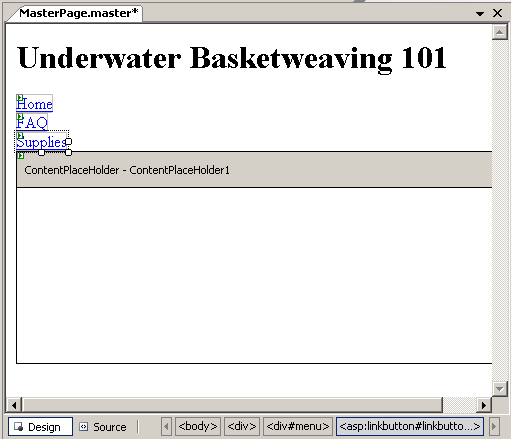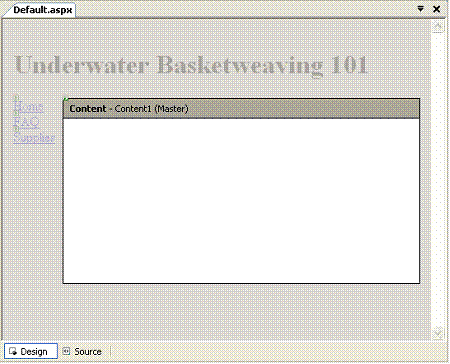Session 8 - Creating Consistent Websites
One of the most important characteristics of a usable website is consistent layout.
If a user is presented with a collection of pages with different layouts, menu choices,
colours etc. it become difficult to work with. A website designer should strive
to create a design which encompasses the entire site, with perhaps minor thematic
changes for different sections. To assist in achieving this ASP.NET 2.0 introduces
the concept of master pages.
A master page is a web page which is created using the Master page template and
is saved with file extension .master. To all intents and purposes is looks just
like an ordinary ASP.NET web page with one important difference: you can place content
place holders on a master page which will get replaced by custom content when you
start developing your actual pages. A master page will have one or more ContentPlaceHolder
controls on it. When a page is created using the master page as its template each
ContentPlaceHolder gets replaced by a Content control. The designer can modify the
Content control to provide the distinct content for the page.
Step by step
Before you start you must have a clear idea of the layout of the pages on your site,
preferably with a visual design. This is used to form the basis for your master
page.
For the purpose of this example the following design will be implemented:

The layout will be implemented using three <div>s and a simple stylesheet
to position the content.
- Create a new C# Empty Website called MasterPages.
- Select File | New File ...
- Choose Master Page from the list and click
Add.

You will see a web page with a large ContentPlaceHolder on it. This will become
the part of your web pages that contains the information. You need to build the
design of your web page around this ContentPlaceHolder.
- Switch to source view and you will see:
<%@ Master Language="C#" AutoEventWireup="true"
CodeFile="MasterPage.master.cs" Inherits="MasterPage" %>
<!DOCTYPE html PUBLIC "-//W3C//DTD XHTML 1.0 Transitional//EN"
"http://www.w3.org/TR/xhtml1/DTD/xhtml1-transitional.dtd">
<html xmlns="http://www.w3.org/1999/xhtml" >
<head runat="server">
<title>Untitled Page</title>
</head>
<body>
<form id="form1" runat="server">
<div>
<asp:contentplaceholder
id="ContentPlaceHolder1" runat="server">
</asp:contentplaceholder>
</div>
</form>
</body>
</html>
- Modify the content of the <div> element to include three <div>s with
the <asp:contentplaceholder> inside the third <div> as follows.
<div>
<div id="header"></div>
<div id="menu"></div>
<div id="main">
<asp:contentplaceholder
id="ContentPlaceHolder1" runat="server">
</asp:contentplaceholder>
</div>
</div>
- Put the heading <h1> with content 'Underwater Basketweaving 101' in the
<div> with id="header".
- Put three LinkButtons into second <div> (id="menu"), with text 'Home', 'FAQ' and 'Supplies'.

- Add a New Item of type stylesheet to the project and add the following code:
#menu
{
width: 150px;
float:left;
}
#main
{
margin-left: 160px;
}
- Open your masterpage in Design view and in properties select DOCUMENT from the
drop down list and set the Stylesheet property to the file you have just created.
- Save the page, and close it.
- Select File | New File ...
- Choose Web Form, select the checkboxes at the bottom labelled 'Place code in separate
file' and 'Select master page', make sure the page name is Default.aspx and click
Add.
- Select MasterPage.master in the following dialog and click OK.

-
When the page opens you will see that the layout is greyed out, and the only area
you can modify is the content of the Content control on the page. Type some simple
text into the Content, e.g. This is the home page!!.
- Put your page content in this section and save the file.
- Repeat steps 14 to 18 to create two pages called FAQ.aspx and Supplies.aspx.
- Open the Masterpage and for each of the LinkButtons set its PostBckUrl to the appropriate
page using the file selector.
- Save your project and run it.
Download the
ZIP version of the MasterPage application.
Session 8 - Workshop
- Reproduce the multi-level page hierarchy from Session 7 using the Master &
Content pages, but use navigation controls in the Master page layout.
Application MasterNavigate
is available for reference.